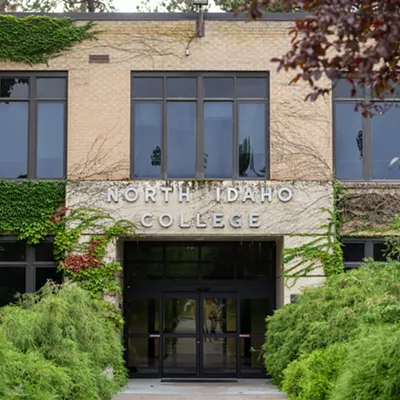ENOUGH PROGRESS?
Last month, the Northwest Commission on Colleges and Universities made its final visit to North Idaho College before commission members will determine if the school can keep its accreditation after nearly three years of uncertainty. The commission released a peer-evaluation report that commends the progress witnessed during the Oct. 14-15 visit to NIC. The report listed a slew of improvements, from updated governing board policies and more efficient board meetings to a reduction in institutional risks and a tentative sense of improved morale across campus. However, the report also states that the evaluators "saw reasons to be cautious" of these improvements. "In interviews onsite, no one expressed high confidence in the sustainability of the board's current trajectory," the report states. The commission's final decision on NIC's accreditation will be made in January. For now, the report states that the Board of Trustees needs to maintain its progress for the school to possibly return to good standing. (COLTON RASANEN)
SWEET SALVAGE
In May, a century-old home tucked in the middle of the Providence Sacred Heart Medical Center campus was demolished by a parking lot management company. For decades, owner Mary Gianetsas refused to sell her home — with stained glass windows, original fixtures and hardwood floors — to the hospital. The 1906 house was henceforth called Mary's Place. After her death, her family eventually sold it, but before it was demolished for hospital parking, preservationists salvaged as much material as they could. On Monday, Spokane City Council unanimously passed the "Mary's Place Preservation Ordinance." It requires anyone demolishing buildings that are at least 50 years old and eligible for historic designation to salvage as many materials as possible for reuse or preservation. The Historic Preservation office is now tasked with guiding demolition applicants to dismantle salvageable materials as carefully as possible. The goal is both preservation and promoting a circular economy that decreases waste and encourages new business opportunities for recycling. (ELIZA BILLINGHAM)
NO PHONE ZONE
Idaho Gov. Brad Little issued an executive order on Oct. 31 called the "Phone Free Learning Act" in collaboration with state Superintendent of Public Instruction Debbie Critchfield. The order encourages all Idaho schools to adopt a district-wide policy restricting cellphones in class by the end of the 2024-25 school year. The order incentivizes school districts to adopt a policy by offering a one-time $5,000 award. If a school district has already implemented a cellphone restriction policy, they can receive a $5,000 reimbursement for expenses incurred rolling it out. In the executive order, Little states, "I join many leaders, including the Superintendent of Public Instruction and my legislative partners in recognizing cellphone use is happening in schools and that cellphones and social media present negative effects on student mental health, development, and learning." Starting this school year, the West Ada School District, the largest in Idaho, adopted a policy to restrict cellphone use in classrooms but allowing them during lunch. At a press conference announcing the executive order, Owyhee High School senior Addilyn Lewis praised the policy, saying, "Ever since West Ada adopted a phone free policy in classrooms, my grades have gone up and I feel more productive. I am grateful for the policy." (VICTOR CORRAL MARTINEZ) ♦

























